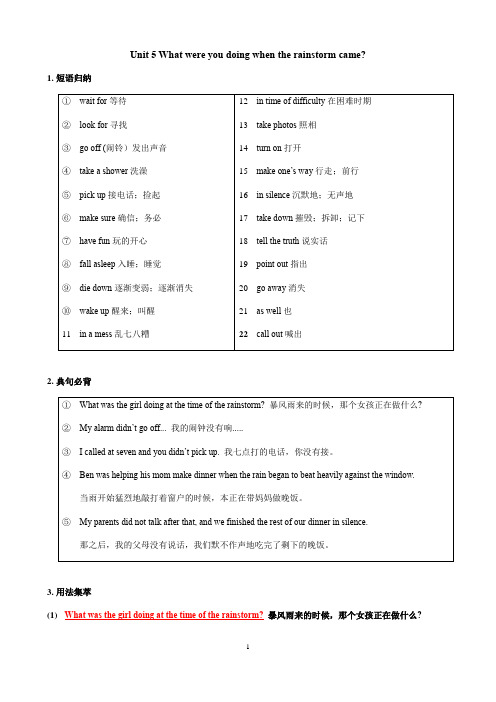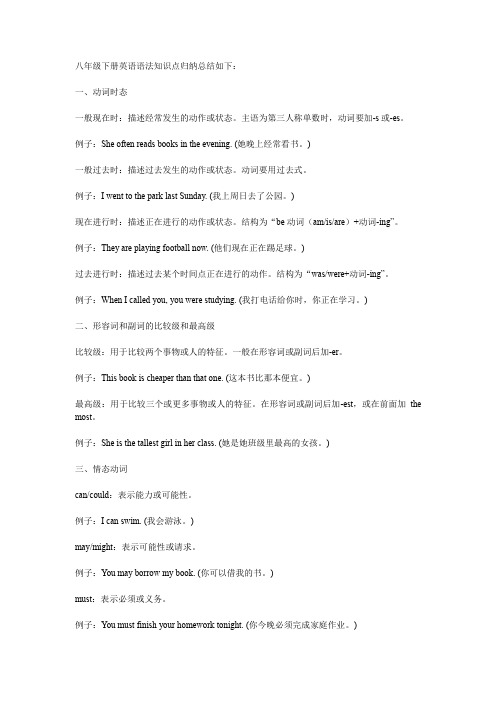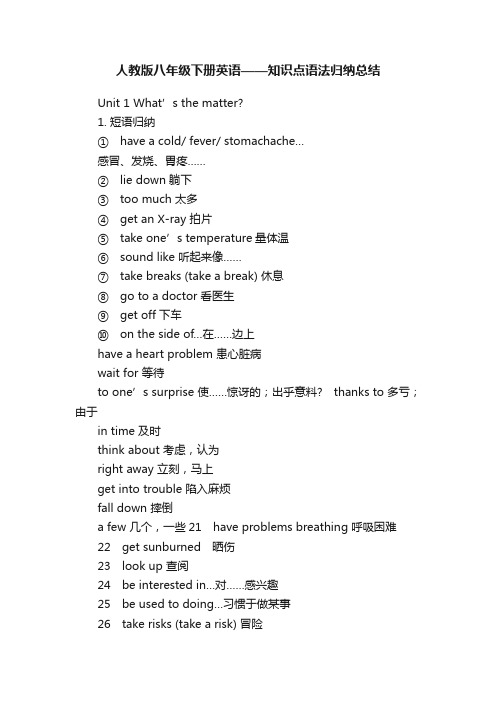八年级下册英语语法
人教版八年级下册英语Unit 5 知识点语法归纳总结

Unit 5 What were you doing when the rainstorm came?1.短语归纳2.典句必背3.用法集萃(1)What was the girl doing at the time of the rainstorm?暴风雨来的时候,那个女孩正在做什么?❖本句是特殊疑问句,时态是过去进行时,结构是“What+was/were+主语+doing+其他?”,用于询问某人在过去的某个时间正在做的事情。
例:—What were you doing at nine o’clock yesterday evening? 昨天晚上九点你正在做什么?—I was watching TV at home. 我正在家里看电视。
❖拓展:过去进行时描述过去某个时刻正在发生的动作或存在的状态,结构是“was/ were+动词的现在分词”。
例:When I got home my mother was cooking. 我到家的时候我妈妈正在做饭(2)My alarm didn’t go off... 我的闹钟没有响.....❖go off意为“(闹钟)发出响声”例:My alarm goes off at six every morning. 我的闹钟每天早晨6点响。
❖归纳:go off还有“离开”和“变质”之意。
例:Bob went off to get a drink. 鲍勃拿饮料去了。
Meat goes off quickly in hot weather. 热天肉变质得快。
❖拓展:go的短语(3)I called at seven and you didn’t pick up. 我七点打的电话,你没有接。
❖pick up意为“接电话”。
pick up有如下含义:(4)I called again at eight and you didn’t answer then either. 我八点再打来,你也没接。
八年级下册英语语法知识点归纳总结

八年级下册英语语法知识点归纳总结如下:一、动词时态一般现在时:描述经常发生的动作或状态。
主语为第三人称单数时,动词要加-s或-es。
例子:She often reads books in the evening. (她晚上经常看书。
)一般过去时:描述过去发生的动作或状态。
动词要用过去式。
例子:I went to the park last Sunday. (我上周日去了公园。
)现在进行时:描述正在进行的动作或状态。
结构为“be动词(am/is/are)+动词-ing”。
例子:They are playing football now. (他们现在正在踢足球。
)过去进行时:描述过去某个时间点正在进行的动作。
结构为“was/were+动词-ing”。
例子:When I called you, you were studying. (我打电话给你时,你正在学习。
)二、形容词和副词的比较级和最高级比较级:用于比较两个事物或人的特征。
一般在形容词或副词后加-er。
例子:This book is cheaper than that one. (这本书比那本便宜。
)最高级:用于比较三个或更多事物或人的特征。
在形容词或副词后加-est,或在前面加the most。
例子:She is the tallest girl in her class. (她是她班级里最高的女孩。
)三、情态动词can/could:表示能力或可能性。
例子:I can swim. (我会游泳。
)may/might:表示可能性或请求。
例子:You may borrow my book. (你可以借我的书。
)must:表示必须或义务。
例子:You must finish your homework tonight. (你今晚必须完成家庭作业。
)四、被动语态被动语态用于描述事物的状态或描述被动发生的动作。
结构为“be动词(am/is/are/was/were)+动词的过去分词”。
八年级英语下册U1—U4语法归纳

八年级英语下册U1—U4语法归纳1 The Adverbial Clauses with when(when引导的时间状语从句)表示主句动作发生的时间。
例1:当他五岁的时候,他开始学习骑自行车。
2 when questions(when引导的特殊疑问句)When:什么时候、何时。
对时间点进行提问。
(in on at+时间点)How long:多久,多长(时间)。
对时间段进行提问。
(for+时间段)时间点和时间段的区别:例2:他什么时候出生?他出生在1996年。
例3你准备这个考试多久了?两个月了。
How soon:多久之后。
用于将来时态。
(in+时间段)例4:人们多久以后可以拥有机器人?五十年后。
How often:多久一次,对频率进行提问。
例5:你多久帮你的父母做一次家务?每天。
3 Tag questions(反义疑问句)①结构:陈述句+一般疑问句②原则:前肯后否,前否后肯③疑问句的主语应与陈述句的主语保持一致,且只能用人称代词替代。
例6:一年级的学生不去公园了,是吗?④回答:事实肯定用yes,事实否定用no,如果是前否的句子,yes译为“不”,no译为“是”例7:他的妹妹没有参加会议,是吗?不,她参加了。
/是的,她没参加。
⑤特殊:A.let’s—shall we let us—will you/won’t youB.祈使句——will you(请求)/won’t you(提醒)例8:看黑板,好吗?、C.陈述部分有few、little、never、seldom、hardly、no、not、no one、nobody、nothing、none、neither,疑问句需用肯定结构。
例9:他上学从不迟到,不是吗?、例10:这不公平,不是吗?、D.there be——be there例11:这里有一家医院,不是吗?、E.陈述句部分的主语是everything、nothing、anything或something时,疑问句主语应用代词it。
八年级下册英语句子结构语法知识点归纳总结

八年级下册英语句子结构语法知识点归纳总结主语+谓语- 主语通常是句子中的名词或代词,谓语是句子中的动词。
- 例如:“Tom studies math.”主语+谓语+宾语- 主语、谓语和宾语构成了简单句。
- 直接宾语是动作的承受者,间接宾语是动作的利益受益者。
- 例如:“She bought him a present.”主语+谓语+宾语+宾语补足语- 宾语补足语是指补充或解释宾语的词或短语,通常是形容词、名词或代词。
- 例如:“We elected Tom class president.”主语+系动词+表语- 系动词用来连接主语和表语。
表语用来描述或说明主语。
- 例如:“Tom is sick.”主语+不及物动词- 不及物动词没有宾语,指人、物或状态。
- 例如:“She sleeps early.”主语+及物动词+不定式- 不定式作宾语,即动作的意愿,愿望或目的。
- 例如:“She wants to travel.”主语+及物动词+宾语+不定式- 不定式作宾语,即一个人或物承受这个动作或被影响。
- 例如:“I saw him cross the street.”主语+及物动词+宾语+宾语补足语- 宾语补足语跟在宾语后面,用来描述宾语或说明宾语状态或性质。
- 例如:“He painted the wall blue.”主语+及物动词+间接宾语+直接宾语- 间接宾语代表动作的利益受益者,直接宾语代表动作的承受者。
- 例如:“She gave me a gift.”主语+不定式- 不定式做主语,常用于谈论愿望、目的或意图。
- 例如:“To travel is my dream.”主语+不定式+宾语- 不定式做宾语,通常表示意愿、愿望或目的。
- 例如:“I want to study math.”倒装句(否定词、副词、介词短语或地点等)- 句子主语和谓语动词的位置发生颠倒,常用于强调特定部分或表达某种语气。
初中英语人教版八年级下册重点语法详解( Unit 1-6)

八年级英语下册重点语法详解Unit 1Irene Irene中英文天地 2023-03-16 12:19 发表于广东1.have / get / catch a(n)+疾病名称,表示患某种疾病。
e.g.I have / get / catch a cold.我感冒了。
【拓展】have a bad cold 重感冒have a fever 发烧have a headache 头痛have a stomachache 肚子痛, 胃痛have a toothache 牙痛have a backache 背痛2.lie down 躺下e.g.You had better lie down and have a rest.你最好躺下休息。
3.have a rest = take a rest = rest 休息have a break=have breaks=take a break=take breaks (课间)休息4.away from 离开……;与……有一定的距离(与不同动词搭配,意思会受上下文影响)e.g.They live away from us.他们住的地方离我们远。
5.see sb.doing sth.看见某人正在做某事e.g.When I pass the window I see him drawing a picture.当我经过窗户时,看到他正在画画。
see sb.do sth.看见某人做过某事e.g.I often see him draw pictures.我经常看到他在画画。
6.think twice 认真思考,权衡利弊e.g.We must think twice before we make this decision.我们在做决定之前应该权衡利弊。
7.to one’s surprise 使……惊讶的是,出乎……意料e.g.To their surprise, all the students pass the exam.令他们惊讶的是,所有学生都通过考试了。
人教版八年级英语下册各单元语法点汇总

Unit 1 What’s the matter一、询问某人安康问运及遭到麻烦表达方法(1)询问某人患了何种疾病或遇到了何种麻烦时,常用以下几种构造来表达:What’s the matter (with sb.)〔某人〕怎么了?What’s wrong (with sb.)〔某人〕怎么了?What’s the trouble (with sb.)〔某人〕出什么事了?What happened (to sb.)〔某人〕发生了什么事?Are you OK你没事吧?Is there anything wrong with sb.?某人有什么事吗?(2)要表达身体疼痛或不舒服,可用以下构造:①某人+have/has+病症.The twins have colds.双胞胎感冒了。
某人+have/has+a+headache/toothache/stomachache/backache/earache. She had a stomachache last night.她昨晚肚子痛。
③某人+have/has+a+sore+发病部位.He has a sore throat.他喉咙痛。
④某人+hurt(s)+身体部位或反身代词.He hurt his leg.他腿受伤了。
⑤某部位+hurt(s).My head hurts badly.我头痛得厉害。
⑥某人+have/has+a pain+in one’s+身体部位,I have a pain in my chest.我胸口痛。
⑦(There is)something wrong with one’s+身体部位.There is something wrong with my right eye..我右眼有毛病。
⑧其他表达方式She has a heart trouble.她有心脏病。
He got hit on the head他头部受到了撞击。
She cut her finger.她割破手指了。
人教版八年级下册英语——知识点语法归纳总结

人教版八年级下册英语——知识点语法归纳总结Unit 1 What’s the matter?1. 短语归纳①have a cold/ fever/ stomachache…感冒、发烧、胃疼……②lie down 躺下③too much 太多④get an X-ray 拍片⑤take one’s temperature量体温⑥sound like 听起来像……⑦take breaks (take a break) 休息⑧go to a doctor 看医生⑨get off 下车⑩on the side of…在……边上have a heart problem 患心脏病wait for 等待to one’s surprise 使……惊讶的;出乎意料? thanks to 多亏;由于in time 及时think about 考虑,认为right away 立刻,马上get into trouble 陷入麻烦fall down 摔倒a few 几个,一些21 have problems breathing 呼吸困难22 get sunburned 晒伤23 look up 查阅24 be interested in…对……感兴趣25 be used to doing…习惯于做某事26 take risks (take a risk) 冒险27 lose one’s life 丧生28 became of 因为29 run out (of) 用尽,耗尽30 be ready to do sth. 准备做某事31 cut off 切除32 climb down 爬下33 get out of 离开;从……出来34 tell of 讲述35 the importance of (doing sth.) (做某事的)重要性36 be in control of 掌管,管理37 make a decision 做决定38 keep on doing sth. 坚持做某事39 give up 放弃40 cut/ hurt oneself 使自己受伤2. 典句必背①What’s the matter?②I have a stomachache.③What should I do?④Should I take my temperature?⑤I think you should lie down and rest.⑥If your head and neck still hurt tomorrow, then go to a doctor.⑦His love for mountain climbing is so great that he kept on climbing mountains even after this experience.3. 用法集萃(1) 当别人心情不好,身体不适或遇到麻烦时,我们可以用如下表达表示关心:What’s the matter?What’s the matter with you?What’s wrong with …?What’s the trouble\problem with …?(2) 英语中常用have描述身体的不适,此时have意为“患有”,常用结构:①have a + 疾病例:have a cold 感冒;have a fever 发烧;have a cough 咳嗽②have a + 身体部位-ache例:have a headache 头痛;have a toothache 牙痛③have a sore + 身体部位例:have a sore throat 咽喉痛;have a sore back 背痛(3) lie down躺下;tell lies/a lie 说谎含义过去式过去分词躺;平躺lay lain位于撒谎;说谎lied lied(4) maybe & may be①maybe,“或许”,常用于句首,表示可能性,后加句子。
八年级下册英语语法

Unit6 Fun CyclingTopic1 We’re going on a spring field trip一. 重点词汇( 一) 词形转换:1.discuss(名词) discussion2.queen(对应词) kingfortable(名词) comfort4.safely (形容词) safe (名词) safety( 二) 词的辨析1. find out / look for / find2. cost / pay for / spend on3. other /else4. raise /rise5.each /every6.exciting / excited(三)重点词组:1.go on a visit to 去……旅行2. make the decision 做决定3.bring back 带回4.go on a field trip 去野外旅行5.decide on (upon) sth 对某事做出决定6 see the sunrise 看日出7. make a reservation 预订8. come up with 想出(主意)9. look forward to (doing) sth 期望10. pay for 支付;赔偿11. raise money 筹钱12. book a ticket 订票13. make a room for sb 为……订房间14. have a wonderful time 玩得愉快15. in the daytime 在白天16. a two-day visit 为期两天的旅行17.find out 查出18. some places of interest 名胜19. rooms with bathtub 带浴室的房间20.a hard (soft) sleeper 硬(软)卧21.my pleasure 不客气二.重点句型及重点语言点1. I have some exciting news to tell you. 我有一些激动人心的消息要告诉你们。
- 1、下载文档前请自行甄别文档内容的完整性,平台不提供额外的编辑、内容补充、找答案等附加服务。
- 2、"仅部分预览"的文档,不可在线预览部分如存在完整性等问题,可反馈申请退款(可完整预览的文档不适用该条件!)。
- 3、如文档侵犯您的权益,请联系客服反馈,我们会尽快为您处理(人工客服工作时间:9:00-18:30)。
模块一语法表示感觉和知觉的系动词1.表示感觉和知觉的系动词也可称为感官动词,主要有look (看起来), smell (闻起来), sound (听起来), taste (尝起来), feel (感觉/摸起来)。
2.感官动词属于连系动词,后接形容词作表语,构成系表结构,说明主语所处的状态。
例如:He looks tired. 他看起来累了。
These flowers smell sweet. 这些花闻起来香Her voice sounds beautiful. 她的声音听起来优美。
The cake tastes delicious .蛋糕尝起来美味。
I felt guilty. 我感到内疚。
3.感官动词后可接介词like, like后可接名词或v.ing形式。
例如:That boat looks like a duck.那条船看起来像一只鸭子。
It smells like being burnt.它闻起来像烧焦了一样4.含有感官动词的句子,其否定句和一般疑问句要借助助动词完成。
例如:He looks worried. 他看起来忧愁。
→He doesn't look worried他看起来并不忧愁。
→Does he look worried?他看起来忧愁吗?Ⅰ. 单项选择( )1. The cake ________ delicious. I can't wait to eat it. A.feels B.sounds C.becomes D.smells( )2.Apples of this kind ________.A.tastes good B.tastes well C.taste good D.taste well( )3.[2015•潍坊]The new sweater I bought for my grandma ________ soft. She likes it very much. A.looks B.smells C.tastes D.feels( )4. —Oh, I'm hungry. Mum, can I have the hamburger on the plate? —No. It tastes________.A. terriblyB. terribleC. goodD. well( )5.—The cake looks ________. —Yes, and it tastes even ________.A. well; goodB. nice; betterC. good; worseD. better; best( )6.[2015•镇江]—ThreeD printing technology could be used to build a house in less than 24 hours.—It ________ amazing. It's my first time to get to know the news A.looks B.smells C.sounds D.tastes( )7.Oh, it________so nice. What beautiful music it is! A.smells B.sounds C.tastes D.looks ( )8.—Dinner is ready. Help yourself! —Wow! It ________ delicious. You are really good at cooking. A.looks B.sounds C.tastes D.feels( )9.—Let's go on a picnic this weekend, OK? —That sounds________.A.great B.well C.hardly D.terribly( )10.I like to read English in the garden because the flowers in it smell ________.A.good B.well C.bad D.badly( )11.—Do you like swimming in winter?—Of course. The water ________ a bit cold at first, but then I am warm and full of energy.A.tastes B.feels C.smells D.looks( )12.Mum is making dinner. It ________ so nice! A.smells B.tastes C.feels D.sounds ( )13.Good medicine for health ________ bitter to the mouth. A.feel B.tastes C.feels D.taste ( )14.Some of my friends eat with their eyes. They prefer to order what ________ nice.A.feels B.smeels C.looks D.tastes( )15.—Do you know the song Gangnam Style?—Of course. It ________ interesting.A.t astes B.smells C.sounds D.feelsⅡ.根据汉语意思完成句子1.我的毛衣摸起来柔软。
My sweater ____________.2.聚会听起来太吵了。
The party ____________________.3.你妈妈看上去很年轻。
Your mother ______________________.4.汤尝起来咸了。
The soup ___________________5.它闻起来新鲜吗?6.他看上去像一位专家。
He ___________ an expert.7.这食物尝起来怎样?________ ________ the food ________?8.这个主意听起来有趣吗?________ the idea ________ interesting? 9.你叔叔长什么样?________ ________ your uncle ________ ________?10.他当众讲话对并不紧张。
He ________ ________ ________.when he speaks in public.Ⅲ.用所给词的适当形式填空1.The cloud ________ (look) like a horse2.The coat _______ (feel) very soft. So she bought it at once3.The weather ______________ (get) warmer and warmer these days.4.The man ______ (seem) to be very angry.5.That idea ________ (sound) very great.6.The baby panda looks very ________(love).7.Don't eat the fish. It smells ________(badly).8.The background music sounds ________(noise). Please turn it down.9.—What do you think of the milk?—Oh, it ________( taste ) good.10.I felt ________(relax) lying in the sun. What a good time!模块二语法现在完成时(一)现在完成时用来表示在以前某个时间或某段时间已经发生的行为或曾经做过的事情对目前有某种影响;还可以表示到目前为止已经完成的事情。
现在完成时态的基本句型结构是:“have/has+动词的过去分词”。
其用法主要有1.当句子的主语是第三人称单数时,要用“has+动词的过去分词”。
例如:He has finished his homework.他已经做完作业了。
2.动词的过去分词变化形式主要有以下几种:大部分动词的过去分词和过去式相同,但也有许多不规则变化,需要特别记忆。
例如:see—saw—seen, be—was/were—been, come—came—come, go—went—gone, take—took—taken等。
3.现在完成时的否定形式为haven’t/hasn’t+动词的过去分词,其一般疑问句形式是把have/has 提到句首,动词过去分词不变化。
例如:I have seen this film. 我已经看过这部电影了。
I haven't seen this film. 我没看过这部电影。
—Have you seen this film? 你看过这部电影吗?—Yes, I have./No, I haven't. 是的,我看过。
/不,我没看过。
He has been to Beijing. 他去过北京。
He hasn't been to Beijing. 他没去过北京。
—Has he been to Beijing?他去过北京吗?—Yes, he has./No, he hasn't. 是的,他去过。
/不,他没去过。
Ⅰ.单项填空( )1.[2014•赤峰]—The storybook is very interesting. —I agree with you. I________ it twice already. A.read B.will read C.am reading D.have read( )2.—Hasn't Betty come yet? —No, and I________ for her for nearly two hours.A.wait B.waited C.have waited D.had waited( )3.—Do you want to see the film 3D Titanic? —The film 3D Titanic? I________ it. It's really wonderful. A.see B.have seen C.was seeing D.has seen( )4.—Have you ever been to Beijing? —________. I went there last year.A.Yes, I did B.Yes, I have C. No, I haven t D.No, never( )5.—Where is your father? —He ________ Dalian.A. have gone toB. has gone toC. have been toD. has been to( )6.[2014•广州]Miss Brown, we ________ cleaning our classroom. Can we go home now?A.finish B.finishing C.are finished D.have finishedⅡ.用所给词的适当形式填空1.Mum, can I watch TV now? I ___________ (finish) my homework.2.The boys ___________ (not read) the interesting books yet.3.—______ you _______ (hear) from your pen pal recently?—Yes, I have. I ______ (get) a letter from him yesterday.4.—_______ you ever ________ (eat) the pizza? —No, I haven't.5.—_____ you _______(call) your mum yet? —Yes, I _____.I (call) her last night.6.—Jack (visit) his grandparents? —Not yet.7.—your parents ever _ (be) abroad? —Yes, just once.8.Who (see) the film before?模块三语法现在完成时(二)1.现在完成时态还可以用来表示“刚刚做完某事;已经做完某事”等,此时经常用just, already和yet来表示,其中,just 表示“刚刚”;already 表示“已经”,一般置于have/has 之后;just和already都用于肯定句中,在否定句和疑问句中则可用yet,表示“还未”。
